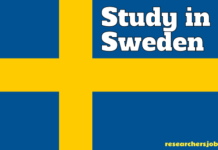Designation/Position- International PhD Program
The LabEx ParaFrap, France invites application for International PhD Program (project in Parasitology) for eligible and interested candidates
About- The international PhD program of the French national research project ‘ParaFrap’ is currently open for applications for 17 Ph.D. positions to be started in October 2021. The LabEx (Laboratory of Excellence) ParaFrap is a Health Sciences collaborative research program focusing on Molecular and Cellular Parasitology in its wider sense. The network gathers 26 French leading groups in the field and is funded by the Excellence Initiative of the French Ministry of Research. Four major research fields are investigated in protozoan models such as Plasmodium, Toxoplasma, Leishmania, Trypanosoma and Cryptosporidium:
Ø Post-genomic data exploration
Ø Mechanisms of pathogenesis and protective immunity
Ø Parasite molecular and cellular biology
Ø Towards new intervention strategies against parasitic pathogens
Study level- Ph.D. project in science
Location- The LabEx ParaFrap, France
Eligibility/Qualification–
1. Applicants must have achieved academic excellence and be highly motivated to pursue a Ph.D. project in Parasitology. They should have obtained a ‘Masters 2’ degree or an equivalent (5 years after high/secondary school) in science by July 2021; out of this format, only exceptional applications (upon justification) will be considered by the program director.
2. English language skills are mandatory.
3. The PhD program does not have an age restriction, but most accepted candidates are 24-26 years old and start their Ph.D. within a year of finishing their M.Sc., a few of them within 3 years.
4. Mobility between the Master’s lab and the Ph.D. host lab is mandatory, meaning that the applicants must change from their present Research Director and Institute to another for the Ph. D. training.
Job/Position Description-
- The ParaFrap International Ph.D. program is an ambitious program offering competitive Ph.D. grants to high-quality students/early stage scientists.
- Applications are open to non-French students.
- The early stage scientists will be joining research projects selected by an external scientific board and managed by a main supervisor and a co-supervisor from two distinct research groups of the LabEx.
- These core research projects will focus on the use of state-of-the-art post-genomic tools to enhance knowledge of the parasites’ biology and of their interactions with their hosts.
- Research group is committed to providing ParaFrap Ph.D. students with the best starting platform for a successful career in science. Additional information about ParaFrap can be found on http://www.labex-parafrap.fr/en.
| TITLE | Main PI |
| How does T. gondii modulate neuronal responses and antigen presentation to evade immune recognition throughout chronic infection? | Nicolas BLANCHARD |
| Characterization of a central transcriptional regulator for the metabolic adaptation of Toxoplasma towards its host | Cyrille BOTTÉ |
| Role(s) of glycerol metabolism in the biology of African trypanosomes | Frédéric BRINGAUD |
| Role of a host peroxiredoxin in blood stage growth of malaria parasites | Chetan E. CHITNIS |
| How do parasites manipulate the behaviour of their vectors? A comparative spatial transcriptomic study in Anopheles and Glossina sensory organs. | Anna COHUET |
| Optimisation of antiparasitic redox-active 3-benzylmenadiones and of drug partners for effective drug combination by oral administration | ElisabethDAVIOUD-CHARVET |
| Study of in vivo P. vivax and falciparum – host bone marrow interactions | Sylvie GARCIA |
| The molecular drivers of antigenic variation in African Trypanosomes | Lucy GLOVER |
| The Epigenetic Role(s) of MORC-containing Complexes Operating in the Hidden Face of the T. gondii Life Cycle or Regulating Virulence Genes in the Human Malaria Parasite | Mohamed-Ali HAKIMI |
| PfPP1 contribution to egress in asexual and sexual stages of the malaria parasite Plasmodium falciparum | Mauld H. LAMARQUE |
| Identification of curative treatments to control cryptosporidiosis and the associated molecular mechanism | Fabrice LAURENT |
| Deciphering how erythroblast infection by Plasmodium falciparum induces a delay in erythropoiesis | Catherine LAVAZEC |
| Studying two complementary infection models to identify common mechanisms of intracellular parasite survival: The roles of Leishmania and Eimeria exo-kinases in subversion of host cell signalling. | Najma RACHIDI |
| DevDermTryp – Development of dermal trypanosomes | Brice ROTUREAU |
| Targeting a Plasmodium propeller domain protein to prevent malaria liver stage infection | Olivier SILVIE |
| Unravelling the role of epigenetic factors which control the DNA replication in Leishmania | Yvon STERKERS |
| How does a Toxoplasma gondii bradyzoite cope with the small intestine surface biochemical, topographical and rheological properties to colonize the enterocytes | Isabelle TARDIEUX |
How to Apply-
https://parafrap.application.systems/site/index.php
Last Date for Apply– 10 April 2021
See Also:- Post-doctoral Fellow position in IIT Gandhinagar, Gujarat, India
Scientific Positions at CSIR-NBRI, Lucknow: Apply by 27 Feb. 2021
Google Summer of Code Internship (Global Program), Apply by 20 February…








